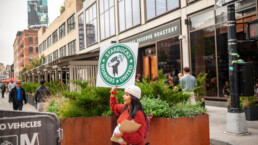Amid the upsurge of NLRB wins, workers are still struggling to secure their first contracts—and real change in the workplace.
by Sarah Jaffe, The Progressive
On the morning of December 16, workers from about 100 Starbucks stores across the United States began a three-day strike. They were protesting the company’s closure of unionized locations and its refusal to bargain with workers at more than 260 stores who have already voted to become part of Starbucks Workers United.
That same morning, workers from Planned Parenthood North Central States (PPNCS) held a virtual press conference to tell reporters how their bargaining process was going. Ashley Schmidt, a training and development specialist for Planned Parenthood clinics in Nebraska and Western Iowa, noted that the desire to unionize among clinic workers was a sign of the need for change at the organization, and it “deserves to be met with goodwill and without stalling.”

These were just a few of the workers who have voted to unionize in recent years, in an upsurge of victories in National Labor Relations Board (NLRB) elections, but who are still struggling to secure their first contract. In some cases, like at PPNCS, workers have been able to meet with management. But, as worker Grace Larson—who was featured in this column last September—says, the meetings left workers “generally disappointed” in their employer’s response to the process.
Recent Posts
‘Unconstitutional. Unethical. Authoritarian.’ ICE Bars Millions Of Immigrants From Bond Hearings
July 18, 2025
Take Action Now One watchdog said the new policy “seems like a blatant attempt to stop them from exercising their right to due process.”……
Americans Are Not Nearly Alarmed Enough About Climate Change
July 18, 2025
Take Action Now Americans still don’t comprehend how imminent, dangerous, and far-reaching the threat is—and journalists are partly to blame.By…
The IRS Is Building A Vast System To Share Millions Of Taxpayers’ Data With ICE
July 17, 2025
Take Action Now ProPublica has obtained the blueprint for the Trump administration’s unprecedented plan to turn over IRS records to Homeland Security…
Israel’s Sudden Assault On Syria Is Unchecked Aggression
July 17, 2025
Take Action Now Jerusalem is bombing Damascus and threatening al-Sharaa’s rule, while Washington was hoping to help the nascent government on…




